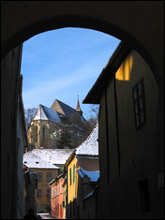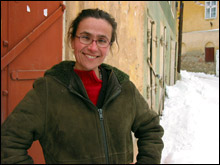
Stephanie Danielle Roth.
Photo: Goldman Environmental Prize.
The Apuseni Mountains of west-central Romania are rich in gold, iron, and history. The area’s gold once supplied the Roman Empire, and it is home to Rosia Montana, the country’s oldest documented mining settlement. But this past is threatened by the present: five years ago, the Romanian government granted rights to a Canadian mining company to build a massive gold mine on top of the ancient town — a project that would force the relocation of 2,000 people, destroy 900 homes and 10 centuries-old churches, and threaten the region’s most important water source.
The people of Rosia Montana — and Romania as a whole — have fought back. Thanks in part to the organizing efforts of Stephanie Danielle Roth, a French and Swiss citizen and former environmental journalist, Romanians have staged large public protests and organized an effective coalition of mine opponents. In 2002, the World Bank withdrew its support for the project, and the European Parliament recently expressed concern that the project “poses a serious environmental threat to the whole region.”
Roth, 34, was awarded one of six 2005 Goldman Environmental Prizes in a ceremony in San Francisco on April 18. She spoke to Grist from San Francisco.
How did you first hear about the proposed gold mine in Romania, and why did you decide to devote yourself to fighting it?
When I heard about the gold mine, I was working in a town in Transylvania, where I was helping organize local opposition against a Dracula theme park. I met a journalist who had just been to Rosia Montana, and he told me that there was a Canadian proposal to construct the largest open-cast gold mine in Europe — the sheer scale of it would be incredible, he said. So 10 days later, I packed a backpack and hitchhiked to Rosia Montana, where the very first day I met the leaders of the local opposition group.
The group consists of property owners who oppose the mine on social, environmental, and cultural grounds. They call themselves Alburnus Maior, which is the old Roman name for Rosia Montana — the Romans mined gold there 2,000 years ago. After I left, I wrote a piece about the proposed mine for The Ecologist magazine, and I stayed in contact with people in Rosia Montana. When the campaign in Transylvania ended successfully, the group contacted me and said, “Hey Steph, do you have any plans? How about coming to Rosia Montana and helping us organize a campaign?” That was three years ago, and now I live and work in Rosia Montana.
You were an environmental journalist before becoming a full-time activist. What led you to change your course?

Roth helped kill plans for a Dracula theme park here.
Photo: Goldman Environmental Prize.
I was sitting in my chair at The Ecologist, writing about these incredible campaigns, and I decided to take a holiday. I went to South America, and everywhere — in Peru, in Chile — I saw environmental problems. I met opposition groups, but they were fighting on the local level, and often these projects are supported by the local governments. These groups were desperate to reach out to more people, to spread out to a larger audience. So I went back to The Ecologist, and I wrote stories about what I had seen, and they were great stories, but I thought, I would like to do this kind of work to empower local communities — I would like to do it for the rest of my life, and I would like to start now.
I understand you were able to organize the first large-scale protests in Romania in more than a decade. What do you think inspired people to fight this particular mine proposal?
What is really incredible about this campaign is how it has mobilized people in Romania. This project embodies the old regime, the injustice and corruption, the development from above. It is the best metaphor for all the things people would like to change in the country.
Under [former Romanian dictator Nicolae Ceausescu, who was executed by firing squad in 1989], thousands of people were involuntarily resettled to make way for the great industrial effort that Mr. Ceausescu had in his mind. So people are saying, “Hey, look, we have a democracy now, but you can still involuntarily resettle people.” The only difference is that in the past, they did it for the great industrial effort, and now it’s in the name of money. In Rosia Montana, we have 10 churches and nine cemeteries — religion is very important to the people of Romania, and they don’t want to accept that these places can be destroyed in the name of money.
What effect have these protests had on the protesters themselves?
It’s been a very liberating experience. Here we have a lot of self-censorship — though we are told Romania is a democracy, the Romanian secret police are still very powerful, and the mining company is exercising intimidation. People in Romania are afraid to express their opinions, so to stand up with a banner in their hand, to say, “We don’t want this,” is very, very liberating. In Bucharest, we organized a forum where locals from Rosia Montana took the microphone. One woman said, “My name is Morgit, I come from Rosia Montana, and my husband and son are buried in the cemetery there — I would like to be buried next to my husband and son.” She was very scared to speak, and afterward she cried. But now that people like her have started speaking, nothing is going to stop them. It’s very liberating for them, and it’s very moving to see.
The World Bank has withdrawn its support for the mine project. What does this mean for your campaign?

The journalist-turned-activist in Rosia Montana, scene of the proposed mine.
Photo: Goldman Environmental Prize.
From a money point of view, this is very important. If the World Bank’s IFC — the International Finance Corporation — had become involved, then other banks would have gotten involved and there would have been money for the project. So [the World Bank withdrawal] is very good for us. But truly, the greatest victory for the local people was when, for the first time in history, all the churches of Romania united and made the official declaration that property in Rosia Montana was not for sale, and that they would refuse to relinquish their property for the mining project. The church is a symbol of the living community, so that was very important to the locals.
You’ve received death threats as a result of your work. What’s given you the courage to keep going?
People like Morgit, who I mentioned earlier — she gives me hope. The leader of the NGO in Rosia Montana is a young farmer, and he’s very wise — he also gives me hope. The locals — how they have reacted, expressed themselves, done things together — give me the strength to keep going.
What’s the greatest challenge still facing your campaign?
Since the World Bank pulled out of the mine project, the mining company is like a dead person being kept alive by its shareholders. It’s time to pull the plug. We have intensified our efforts to convince shareholders of this — we have started some good court cases, which we hope will force the mining company to apply the law, and show its shareholders that the company has been lying to them.
What does this award mean to you?
I feel as liberated as the locals from Rosia Montana when they express their minds. Many times when I do my work, the Romanian government or the mining company will say, “You are a nutcase,” or other [discouraging] things. So for me as a human being — as a woman — this award is a great encouragement for my work.
What do you plan to do with the money?
The prize money will be invested in a fighting fund for the campaign — we will use it to start more legal actions, the kinds of things that are difficult to attract funding for. A very small part of the money, maybe $5,000, I will use to pay my debts — because I work as a volunteer, I have a few debts. So my bank manager will be very happy.

